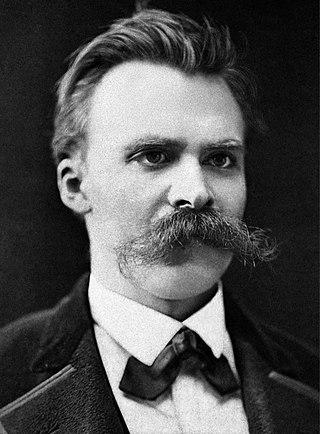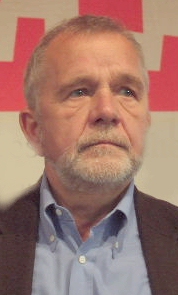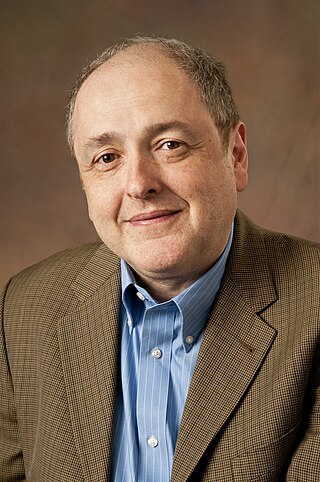Related Research Articles

Friedrich Wilhelm Nietzsche was a German philosopher. He began his career as a classical philologist before turning to philosophy. He became the youngest person to hold the Chair of Classical Philology at the University of Basel in 1869 at the age of 24, but resigned in 1879 due to health problems that plagued him most of his life; he completed much of his core writing in the following decade. In 1889, at age 44, he suffered a collapse and afterward a complete loss of his mental faculties, with paralysis and probably vascular dementia. He lived his remaining years in the care of his mother until her death in 1897 and then with his sister Elisabeth Förster-Nietzsche. Nietzsche died in 1900, after experiencing pneumonia and multiple strokes.
Nihilism is a family of views within philosophy that rejects generally accepted or fundamental aspects of human existence, such as knowledge, morality, or meaning. The term was popularized by Ivan Turgenev and more specifically by his character Bazarov in the novel Fathers and Sons.
1908 (MCMVIII) was a leap year starting on Wednesday of the Gregorian calendar and a leap year starting on Tuesday of the Julian calendar, the 1908th year of the Common Era (CE) and Anno Domini (AD) designations, the 908th year of the 2nd millennium, the 8th year of the 20th century, and the 9th year of the 1900s decade. As of the start of 1908, the Gregorian calendar was 13 days ahead of the Julian calendar, which remained in localized use until 1923.

Johann Kaspar Schmidt, known professionally as Max Stirner, was a German post-Hegelian philosopher, dealing mainly with the Hegelian notion of social alienation and self-consciousness. Stirner is often seen as one of the forerunners of nihilism, existentialism, psychoanalytic theory, postmodernism and individualist anarchism.
This article contains information about the literary events and publications of 1900.

Alfred Richard Orage was a British influential figure in socialist politics and modernist culture, now best known for editing the magazine The New Age before the First World War. While he was working as a schoolteacher in Leeds he pursued various interests, including Plato, the Independent Labour Party and theosophy. In 1900, he met Holbrook Jackson and three years later they co-founded the Leeds Arts Club, which became a centre of modernist culture in Britain. After 1924, Orage went to France to work with George Gurdjieff and was then sent to the United States by Gurdjieff to raise funds and lecture. He translated several of Gurdjieff's works.

Lou Andreas-Salomé was a Russian-born psychoanalyst and a well-traveled author, narrator, and essayist from a French Huguenot-German family. Her diverse intellectual interests led to friendships with a broad array of distinguished thinkers, including Friedrich Nietzsche, Sigmund Freud, Paul Rée, and Rainer Maria Rilke.

Peter Sloterdijk is a German philosopher and cultural theorist. He is a professor of philosophy and media theory at the University of Art and Design Karlsruhe. He co-hosted the German television show Das Philosophische Quartett from 2002 until 2012.

Walter Arnold Kaufmann was a German-American philosopher, translator, and poet. A prolific author, he wrote extensively on a broad range of subjects, such as authenticity and death, moral philosophy and existentialism, theism and atheism, Christianity and Judaism, as well as philosophy and literature. He served more than 30 years as a professor at Princeton University.

The Apollonian and the Dionysian are philosophical and literary concepts represented by a duality between the figures of Apollo and Dionysus from Greek mythology. Its popularization is widely attributed to the work The Birth of Tragedy by Friedrich Nietzsche, though the terms had already been in use prior to this, such as in the writings of poet Friedrich Hölderlin, historian Johann Joachim Winckelmann, and others. The word Dionysian occurs as early as 1608 in Edward Topsell's zoological treatise The History of Serpents. The concept has since been widely invoked and discussed within Western philosophy and literature.

Friedrich Nietzsche (1844–1900) developed his philosophy during the late 19th century. He owed the awakening of his philosophical interest to reading Arthur Schopenhauer's Die Welt als Wille und Vorstellung and said that Schopenhauer was one of the few thinkers that he respected, dedicating to him his essay Schopenhauer als Erzieher, published in 1874 as one of his Untimely Meditations.
Events from the year 1903 in France.

Rüdiger Safranski is a German philosopher and author.
Events from the year 1900 in the United States.

Brian Leiter is an American philosopher and legal scholar who is Karl N. Llewellyn Professor of Jurisprudence at the University of Chicago Law School and founder and Director of Chicago's Center for Law, Philosophy & Human Values. A review in Notre Dame Philosophical Reviews described Leiter as "one of the most influential legal philosophers of our time", while a review in The Journal of Nietzsche Studies described Leiter's book Nietzsche on Morality (2002) as "arguably the most important book on Nietzsche's philosophy in the past twenty years."
The Friedrich Nietzsche Prize or Friedrich-Nietzsche-Preis is a German literary award named after Friedrich Nietzsche and awarded by the state of Saxony-Anhalt. It was first awarded in 1996 for a German-language essayistic or philosophical work. The Friedrich Nietzsche Prize is endowed with 15,000 euros. It is awarded by the Prime Minister of Saxony-Anhalt on the basis of proposals by an international jury.

Events in the year 1900 in Brazil.

Events from the year 1855 in Sweden
Events in the year 1844 in Germany.
References
- ↑ "Prof. Nietzsche Dead". The New York Times. 26 August 1900. Retrieved 23 January 2013.